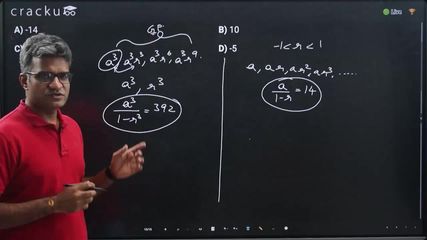The sum of an infinite geometric series of real numbers is 14, and the sum of the cubes of the terms of this series is 392. The first term of the series is
Solution
Let the first term of the infinite G.P. be a and the common ratio be r.
So, Sum of infinite GP= $$\ \frac{\ a}{1-r}=14$$ .............. (1)
The cubes of the terms of original GP= $$a^3,\ \left(ar\right)^3,\ \left(ar^2\right)^3...$$= $$a^3,\ a^3r^3,\ a^3r^6...$$
So, in the new infinite GP, first term is $$a^3$$ and the common ratio is $$r^3$$
Therefore, sum to infinite terms= $$\frac{\ a^3\ }{1-r^3}$$ ...............(2)
Cubing the eqn 1 and dividing by eqn 2, we get,
$$\frac{\ \frac{\ a^3}{\left(1-r\right)^3}\ }{\ \frac{\ a^3}{1-r^3}}=\ \ \frac{\ 14\times\ 14\times\ 14}{392}$$
=>$$\ \frac{1-r^3\ }{\left(1-r\right)^3}\ =\ \ \frac{\ 14\times\ 14\times\ 14}{392}$$
=> $$\ \frac{\left(1-r\right)\left(1+r^2+r\right)}{\left(1-r\right)^3}\ =\ \ \ 7$$
=>$$\ \frac{\left(1+r^2+r\right)}{\left(1-r\right)^2}\ =\ \ \ 7$$
=> $$\ \left(1+r^2+r\right)\ =\ \ 7\left(1+r^2-2r\right)$$
=>$$\ 1+r^2+r\ =\ \ 7+7r^2-14r$$
=>$$\ -6-6r^2+15r\ =\ 0$$
=>$$2r^2-5r+2\ =\ 0$$
=>$$2r^2-4r-r+2\ =\ 0$$
=>$$2r\left(r-2\right)-1\left(r-2\right)=0$$
=>(2r-1)(r-2)=0
.'.r= 1/2 or 2.
In the case of infinite GP, -1 < r < 1.
So, r = 1/2
Putting this value in eqn 1, we get,
$$\ \frac{\ a}{1-\ \frac{\ 1}{2}}=14$$
2a=14
a = 7
Hence, the correct answer is option C.
Video Solution

Click on the Email ☝️ to Watch the Video Solution
Create a FREE account and get:
- All Quant Formulas and shortcuts PDF
- 40+ previous papers with solutions PDF
- Top 500 MBA exam Solved Questions for Free

